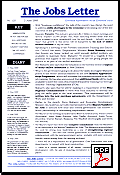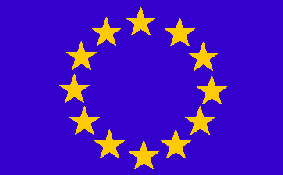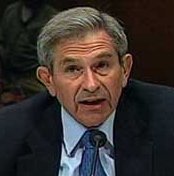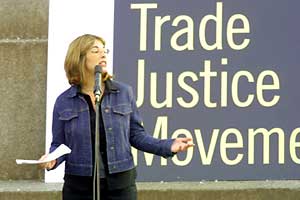|


THE INTERNATIONAL CAMPAIGN TO END WORLD POVERTY
Over the last month, the international community has seen unprecedented moves to help end poverty in the world’s poorest countries — both in cancelling the debt burden of some developing nations, and a renewed commitment to deliver more and better aid to where it is needed.
These efforts will be brought to a focus over the coming week with huge Live Aid-style concerts in 8 countries … all aiming to put pressure on the world's richest leaders gathering at the G8 Summit in Gleneagles in Scotland.
In this special issue, The Jobs Letter looks at how these countries became impoverished, what conditions they are being required to meet in order to qualify for relief, the effect trade barriers and Western agricultural subsidies have on poor countries, and the coming G8 summit, the Alternative8 summit and what people are saying about it all.

 LAST Letter
LAST Letter

NEXT Letter 



Download this issue
as a PDF file

|
MILLENNIUM DEVELOPMENT GOALS
The UN Millennium Summit in 2000, the largest-ever gathering of world leaders, adopted eight
goals, with the aim of eradicating poverty, hunger and disease.
The Millennium Development Goals are a commitment by global leaders to halve poverty and
hunger, provide education for all, improve standards of health, halt the spread of major diseases such as
HIV/AIDS, and slow down environmental degradation by 2015.
The UN Millennium Goals:
—Eradicate extreme poverty and hunger
—Achieve universal primary education
—Promote gender equality and empower women
—Reduce child mortality
—Improve maternal health
—Combat HIV/AIDS, malaria and other diseases
—Ensure environmental sustainability
—Develop a global partnership for development
|
www.un.org/millenniumgoals/
|
Heavily Indebted Poor Countries (HIPC) —
that have already been evaluated and have had their public debts to the IMF, World Bank or Asia Development Bank written-off:

Benin

Bolivia

Burkina Faso

Ethopia

Ghana

Guyana

Honduras

Madagascar

Mali

Maurtania

Mozambique

Nicaragua

Níger

Rwanda

Senegal

Tanzania

Uganda

Zambia.
HIPC who have reached the decision point and may have their public debt written-off, depending on the outcome:

Cameroon

Chad

Democratic Republic of Congo

The Gambia

Guinea

Guinea-Bissau

Malawi

São Tomé Príncipe

Sierra Leone.
Theses countries are recognised as HIPC but are not seriously in the running to have their debts written-off as the international banking establishment doesn't see them making sufficient progress against the criteria:
Burundi, Central African Republic, Comoros, Republic of Congo, Côte d'Ivoire, Lao PDR, Liberia, Myanmar, Somalia, Sudan, Togo.
G7

United States

Britain

Japan

Canada

France

Germany

Italy.
Russia, is part of the G8, but has not been a part of the G7 debt relief negotiations because it was not a contributor to the Western development banks. |
|
ODIOUS DEBT
"If a despotic power incurs a debt not for the needs or in the interest of the State, but to strengthen
its despotic regime, to repress the population that fights against it, etc., this debt is odious for the
population of all the State."
"This debt is not an obligation for the nation; it is a regime's debt, a personal debt of the power that
has incurred it, consequently it falls with the fall of this power."
"The reason these `odious' debts cannot be considered to encumber the territory of the State, is
that such debts do not fulfil one of the conditions that determine the legality of the debts of the State, that
is: the debts of the State must be incurred and the funds from it employed for the needs and in the
interests of the State."
— Alexander Nahum Sack, 1927
Source - Excerpts from Odious Debts: Loose Lending, Corruption, and the Third World's Environmental Legacy by
Patricia Adams, can be found at www.odiousdebts.org/
|
Index to Back Issues
Index to Features

 LAST Diary
LAST Diary

NEXT Diary 
|
 |
DEBTS WRITTEN-OFF FOR SOME OF THE WORLD'S POOREST
The finance ministers of the world's seven richest nations have written-off the debts owed
to international development banks by fourteen African, two Central and two South American
nations. These countries have met the minimum standards of good governance and fiscal responsibility as
assessed by the World Bank, the International Monetary Fund and the Asia Development Bank.
Another nine countries (all African) are expected to qualify for this same debt relief over the next 12 -
18 months.
 |
 |
Finance Minister Gordon Brown
|
British Prime
Minister Tony Blair
|
The debt cancellation — will see a 100% write-off of about $40 billion of public debt.
The measures have been seen as a triumph for it most prominent political proponents British Prime
Minister Tony Blair and his Finance Minister Gordon Brown who say the write-off has set the stage for July's
G8 summit, where world leaders will forge a new and better relationship between the rich and poor
countries of the world. Brown: "We are presenting the most comprehensive statement that finance
ministers have ever made on the issues of debt, development, health and poverty."
Perhaps reflecting the situation faced by the wealthy finance ministers, United States Treasury
Secretary John Snow says the rich countries have grown impatient with endless cycles of "borrow and forgive".
In turn, the ministers agreed it is better to write-off, once and for all, debts that they recognise will never
be paid.
Governments in rich countries have themselves a long history of borrowing. At the end of
the 18th century, Britain owed 215% of its national income to financiers. Yet this massive debt did not
pull down the economy but helped to fuel its Industrial Revolution. The borrowing helped provide the
capital for things like railways and roads, and waste and sewage systems. Such investments built-up
the economy and enriched the lives of people by providing economic opportunities and raising the
standard of living. The borrowing was considered long-sighted and a successful investment in the future of
the country.
The African experience of borrowing has been quite another story. Since the second half of the
20th century, many African countries' were loaned enormous sums of money. On paper, these loans were
for development projects, often for infrastructure. But in the vast majority of cases, projects were not
well thought through and accountability was not only negligent, but often fraudulent and little of the
money was ever used for the purpose it was lent. Instead, corrupt government officials, including the heads
of states, siphoned-off immense amounts and amassed incredible personal fortunes.
Professor John Stremlau of the University of Witwatersrand says a good example was Mobutu
Sese Seko of Zaire (now the Democratic Republic of the Congo). Mobutu pocketed his country's
development loans rather than spend it on the public works. All the while, the US turned a blind eye
because Mobutu served a strategic purpose: he removed the likelihood of an elected communist regime
becoming established in the resource-rich country. During Mobutu's 22-year reign, Zaire received $9.3
billion in foreign aid, primarily from the World Bank and the IMF. The UN Conference on Trade and
Development estimated that nearly $18 billion was wrongly taken out of Zaire during the Mobutu years.
Many African leaders now believe that the IMF and World Bank "loans" were a means of the
West buying influence during the Cold War when the West and the Soviet Union were vying for influence
in Africa. Similar arrangements were in place, using IMF and World Bank billions, with many
clearly corrupt governments including Suharto in Indonesia, Marcos in the Philippines and Moi in Kenya.
Source _ BBC News UK edition, 11 June 2005, "G8 reaches deal for world's poor" New Zealand Herald, 14 June 2005,
"Past aid became debt curse for Africa" Reuters; Guardian Weekly, 14 June 2005, "A truckload of nonsense" by George Monbiot;
New Zealand Herald, 14 June 2005, "Aid funds risk ending up in Swiss bank accounts" by Hamish McRae; Source _ The
Guardian Weekly, 17 _ 23 June 2005, "G7 cancels poorest nations' debt" by staff reporters; The Guardian Weekly, 17 _ 23 June 2005,
"It's high noon for the West" by Larry Elliot; The Guardian Weekly, 17 _ 23 June 2005, "Better to aim high or not at all" by
Andrew Rawnsley; Jublilee Debt Campagin, 11 June 2005, "Campaigners force step forward on debt; Make Poverty History website;
EUROPEAN AID TO REACH 0.7%
 The European Union ministers surprised and delighted aid agencies around the world last
month when they agreed to double their current aid commitments to developing nations. All member
states which joined the EU before 2002 have committed to reach a target of spending 0.51% of their GDP
on foreign aid by 2010, rising to 0.7% by 2015. Hilary Benn, British Development Secretary says
the commitment "sends a powerful message to the world." The European Union ministers surprised and delighted aid agencies around the world last
month when they agreed to double their current aid commitments to developing nations. All member
states which joined the EU before 2002 have committed to reach a target of spending 0.51% of their GDP
on foreign aid by 2010, rising to 0.7% by 2015. Hilary Benn, British Development Secretary says
the commitment "sends a powerful message to the world."
The 0.7% target was set in 1970 by the UN but only four countries — Denmark, Sweden, the
Netherlands and Luxembourg — have met it (and some of these intend to exceed 0.7%). Six others
— Finland, Belgium, Spain, France, Germany and Britain — have now promised to. Countries who
joined the EU since 2002 have longer to reach much lower targets. If all 25 EU member states meet
their pledges, EU collective aid to developing countries will rise from $40 billion this year to $80 billion
in 2010.
 |
Paul Wolfowitz |
Meanwhile, the United States aid commitments are looking decidedly modest at only 0.16
of GDP in 2004, though Washington insists that it bears its share of international burdens. However,
the EU commitment may make the US policy makers think again.
Former US Deputy Secretary of Defence Paul Wolfowitz, who has recently been appointed head of
the World Bank, is now urging the Bush Administration to help fund a big push for Africa. Wolfowitz
regards Africa as "on-the-move" and "full of real partners with whom the West could work". He is
preparing proposals for next week's G8 summit that include extra aid to combat malaria, create
better infrastructure, and boost lending for small and medium-sized businesses.
Wolfowitz believes that Africa could absorb more aid without the cash being swallowed up in
corruption. He appears to be philosophical about some of the problems associated with aid pointing out that
if donors knew that 25% of every dollar was being stolen, but that the other 75% was being spent
on education or treating AIDS patients, then it wouldn't be right to pull the plug and leave the dying,
the needy and the illiterate with nothing. In the long-run, Wolfowitz believes, "Corruption is something
that doesn't survive the light of day very well."
Source - Guardian, 20 June 2005, "Wolfowitz urges extra aid after trip to Africa" by Patrick Wintour; UN News, 25 May
2005, "European Union doubles aid for world's poor"; Guardian Weekly 17-23 June 2005, "It's high noon for the West" by
Larry Elliot.
 Washington has increased its aid commitment by about half but has, so far, refused to follow
the European lead and double its aid to Africa. In order to keep the development momentum going,
British finance minister Gordon Brown is appealing to the oil-producing states of the Middle East to
donate some of their oil wealth to Africa. Brown says oil producing countries such as Saudi Arabia, the
United Arab Emirates and Kuwait could help. Brown: "I would like to see the countries that have done well
out of the rise in the oil price being willing to make a contribution also to the new development agenda,
and particularly to debt relief and to international aid." Washington has increased its aid commitment by about half but has, so far, refused to follow
the European lead and double its aid to Africa. In order to keep the development momentum going,
British finance minister Gordon Brown is appealing to the oil-producing states of the Middle East to
donate some of their oil wealth to Africa. Brown says oil producing countries such as Saudi Arabia, the
United Arab Emirates and Kuwait could help. Brown: "I would like to see the countries that have done well
out of the rise in the oil price being willing to make a contribution also to the new development agenda,
and particularly to debt relief and to international aid."
 |
Naomi Klein |
In contrast, trade and justice activist Naomi Klein writes in
The Nation that instead of OPEC oil wealth being used to "save Africa," sub-Suharan Africa must be allowed to use its own wealth to
save itself. Africa is a rich continent with, not just oil reserves, but also gas, diamond, gold, platinum,
chromium, ferroalloy and coal resources.
Klein argues that 70% of Nigerians still live on less than $1 a day while Shell Oil is still
making superprofits. And Equatorial Guinea, which has a major oil deal with ExxonMobil, is getting a
mere 12% of the oil revenues in the first year of its contract — a share so low, Klein says, it would have
been scandalous even at the height of colonial oil pillage.
Klein says what keeps Africa poor is not a lack of political will but the tremendous profitability of
the current arrangement. The poorest continent on earth is also the world's most profitable
investment destination. According to the World Bank's 2003 Global Development Finance report, Africa
offered the highest returns on foreign direct investment of any region in the world. Klein: "Africa is poor
because its investors and its creditors are so unspeakably rich."
Source - The Times, 05 June 2005, "Brown wants oil countries to donate cash for Africa" by David Smith; The Nation, 27
June 2005 issue, "A noose, not a bracelet" by Naomi Klein.
SPOTLIGHT NOW ON FAIR TRADE
Even with the heartening news of debt relief and more aid, fair trade campaigners say there is
a missing leg to the stool that could lift Africa out of poverty: Western agricultural subsidies.
Jonathan Glennie, of Christian Aid: "If Gordon Brown thinks doubling aid will end poverty he has been
reading the wrong literature."
A systemic advantage all wealthy countries hold over impoverished ones is their agricultural
subsidies. Subsidies paid to rich countries' farm producers allow them to sell their goods for less than it costs
to produce them. They are therefore able to undercut the prices of goods imported from less
developed countries. This arrangement also allows them to sell their artificially cheap goods into developing
countries, which results in stifling local development. No poor countries subsidise their farm producers
… but all G7 countries can and do subsidise theirs.
Nicky Oppenheimer, chairman of the De Beers Group: "It is more politically expedient to pour aid
into Africa than for Europe and America to cut farm subsidies, which enable their own farmers to dump
their produce in Africa and impoverish African producers. While those subsidies and tariffs remain in
place, the campaign to lift Africa out of poverty will remain mired in hypocrisy."

The Commission on Africa — launched by British Prime Minister Tony Blair in 2004 to take
a fresh look at Africa's development — has pointed out that the EU remains "the largest protector
of agriculture in the world", and is still dumping surplus foodstuffs at a fraction of what it costs to
produce them.
European farm subsidies — the Common Agricultural Policy or CAP — was instituted at a time
when the memory of post-War food shortages were vivid in Europe and agriculture was a key element in
the continent's recovery. But Tony Blair insists times have changed and he will be putting the elimination
of the EU CAP on the table at the G8 summit. And Blair will use Britain's presidency of the
European Union, which begins next month, to argue that the CAP is a wasteful anachronism. Blair: "It does
not reflect the economic priorities of the European Union in the 21st century. We have made it clear that
the Commission's budget should be fundamentally reviewed with a view to removing these distortions."
 The Confederation of British Industry is among those who are backing the call to reform
farm subsidies. Director-general Sir Digby Jones: "Africa needs more money, but if it's not linked to
ending European agricultural subsidies, it's blatant hypocrisy. The way to build lasting economic
growth, healthcare and education is for Europe to end the CAP. Stopping trade-distorting subsidies will
allow African products to be exported and stop European goods being sold more cheaply in Africa." The Confederation of British Industry is among those who are backing the call to reform
farm subsidies. Director-general Sir Digby Jones: "Africa needs more money, but if it's not linked to
ending European agricultural subsidies, it's blatant hypocrisy. The way to build lasting economic
growth, healthcare and education is for Europe to end the CAP. Stopping trade-distorting subsidies will
allow African products to be exported and stop European goods being sold more cheaply in Africa."
The figures. CAP subsidies swallow up more than 40% of the EU budget for the benefit of 5% of
its population. Other European industries — mining, manufacturing and textiles — have been exposed
to the rigours of the markets for many years. European taxpayers currently provide their farmers with
$30 billion in subsidies each year. And the OECD estimates that the resulting inflated food prices due
to CAP pushes the cost to European consumers up to $70 billion per year.
THE FINE PRINT …
The conditions the poor countries are required to meet in order to qualify for debt relief are
much more than showing "good governance and accountability", as reported in the media. The debt
relief statement that the G7 finance Ministers have signed includes that for countries to qualify they had
to "tackle corruption, boost private sector development" and eliminate "impediments to private
investment, both domestic and foreign".
These conditions may sound reasonable, but the recent experience for Uganda — one of those
qualifying for debt relief — has been that it had had to sell most of its state-owned companies.
UK-based ActionAid has called on the G8 to announce that developing nations will no longer be required
to privatise their infrastructure. But there has been little reported in the media about this and it
seems unlikely to gain traction at the G8 summit.
Source - The Independent, 19 June 2005, "Why millions of Africans have a stake in the outcome of Europe's farm row" by
Angela Merkel; Guardian, 19 June 2005, "How Europe cheats Africa" by Heather Stewart; Guardian, 19 June 2005, "Blair vows
to break up CAP for Africa's sake; Reuters, 14 June 2005, "Wolfowitz says cuts in agriculture subsidies needed" by
Lesley Wroughton"; ActionAid International website "Taking action: G8: Cautious welcome for debt relief package.
The African countries are also being required to drop their trade barriers — the same
barriers that Western producers in the US and EU are keeping in place themselves. The effect of dropping
the trade barriers in developing nations has been immediate. Just three examples:
Frozen chicken: African countries have seen a dramatic rise in imports of cheap frozen chicken
parts from the EU. Since European poultry farmers are able to feed their birds on subsidised grain, they
can undercut local producers by half. Having their markets forced open to subsidised imports has
devastated the developing poultry industry in countries such as Ghana and Senegal.
Maize: In many parts of Africa maize is the staple diet, often ground into meal to make porridge.
Subsistence farmers as well as larger operators used to sell their excess production to local poultry
producers. But that market has collapsed due to the decline of the domestic chicken industry.
Tomatoes: Since African countries were forced to dismantle tariffs protecting local growers, they
have been unable to compete with European farmers, who receive export subsidies. Canned tomatoes
and tomato paste from Europe have prevented processors in West Africa getting on their feet. The
resulting slump in demand for domestic products has resulted in African tomato production falling by two-thirds.
LIVE 8 CONCERTS
 Sir Bob Geldof and U2's Bono and others have thrown their celebrity weight behind the
eradication of poverty in impoverished nations. To push the point, they are organising eight free concerts on
2 July, just prior to the G8 summit. Sir Bob Geldof and U2's Bono and others have thrown their celebrity weight behind the
eradication of poverty in impoverished nations. To push the point, they are organising eight free concerts on
2 July, just prior to the G8 summit.
TV2 will be carrying a live broadcast of the Live 8 concerts beginning early on Sunday morning (3
July) from 2 am to 12 noon. The concerts will be coming from London's Hyde Park, the Circus Maximus
in Rome, beneath the Eiffel Tower in Paris, the Pottsdamer Platz in Berlin and from the steps of the
Museum of Art in Philadelphia. There will also be concerts held in Tokyo, Toronto and
Johannesburg. Artists scheduled to perform include U2, Coldplay, Mariah Carey, Elton John, Paul McCartney,
Madonna, Will Smith, Bon Jovi, Stevie Wonder, Maroon 5, Andrea Bocelli, Duran Duran
and Stereophonics. The Live 8 organisers expect more than a billion people around the world to watch
the live broadcasts.
Ironically, the concerts fall on the same day long-time poverty campaigners — Jubilee groups,
Make Poverty History, the ONE campaign, ActionAid and others — have called for supporters to
converge on Edinburgh to show support for the end of poverty to the G8 leaders.
 The G8 Alternative Summit, also being held in Edinburgh, will begin on 3 July. Organisers
say 5,000 leading human rights campaigners and environmental thinkers from all parts of the world
will "battle" the strategies and ideas coming out of the G8 summit. Among those addressing the
alternative summit are Ken Wiwa, son of the murdered Nigerian novelist Ken Saro-Wiwa; Moazem Begg,
former prisoner at Guantanamo Bay; Craig Murray, former UK ambassador to Uzbekistan; Willie
Madisha, president of the South African trade union federation and former UN weapons inspector Scott Ritter. The G8 Alternative Summit, also being held in Edinburgh, will begin on 3 July. Organisers
say 5,000 leading human rights campaigners and environmental thinkers from all parts of the world
will "battle" the strategies and ideas coming out of the G8 summit. Among those addressing the
alternative summit are Ken Wiwa, son of the murdered Nigerian novelist Ken Saro-Wiwa; Moazem Begg,
former prisoner at Guantanamo Bay; Craig Murray, former UK ambassador to Uzbekistan; Willie
Madisha, president of the South African trade union federation and former UN weapons inspector Scott Ritter.
www.g8alternatives.org/
|

... over 420 charities, church groups and other organisations, plus a sprinkling of celebrities, know
that this is the year that world poverty can truly be tackled head on.
www.makepovertyhistory.org/

… an international development agency whose aim is to fight poverty worldwide. For over 30
years ActionAid has been growing and expanding to where today it is helping over 13 million of the
worlds poorest and most disadvantaged people in 42 countries worldwide.
http://www.actionaid.org/

… a coalition of local/regional groups and national organisations whose focus is on changing UK
government policy on debt, including to ensure that the maximum influence is brought to bear on the
World Bank and IMF.
http://www.jubileedebtcampaign.org.uk
|

ONE is a new effort by Americans to rally Americans — ONE by ONE — to fight the emergency
of global AIDS and extreme poverty.
http://www.one.org/

… a confederation of 12 organizations working together with over 3,000 partners in more than
100 countries to find lasting solutions to poverty, suffering and injustice.
www.oxfam.org/eng
www.oxfam.org.nz/

http://www.commissionforafrica.org/ |
BEYOND PHILANTHROPY …
 |
George Monbiot |
Fair trade activist and
Guardian columnist George Monbiot says that the real danger at the
G8 summit is that it will follow the agenda being set by Live 8's Bob Geldof and Bono. He argues that
the entertainers have assumed the role of arbiters, determining whether the leaders of the G8 nations
should be congratulated or condemned for the decisions they make. Monbiot: "They are not qualified to do
so, and I fear that they will sell us down the river."
Monbiot says anyone with a grasp of development politics who had read and understood the
ministers' statement on debt-relief could see that the conditions it contains — enforced liberalisation and
privatisation — are as onerous as the debts it relieves. Geldof has praised the debt relief as "a victory for
the millions of people in the campaigns around the world" and Bono pronounced it "a little piece of
history". But Monbiot says: "Like many of those who have been trying to highlight the harm done by such
conditions — especially the African campaigners I know — I feel betrayed by these statements. Bono
and Geldof have made our job more difficult."
Monbiot: "I understand the game they're playing. They believe that praising the world's most
powerful men is more persuasive than criticising them. The problem is that in doing so they turn the
political campaign developed by the global justice movement into a philanthropic one. They urge the G8
leaders to do more to help the poor. But they say nothing about ceasing to do harm. Listen to these men
— Bush, Blair and their two bards — and you could forget that the rich nations had played any role
in Africa's accumulation of debt, or accumulation of weapons, or loss of resources, or collapse in
public services, or concentration of wealth and power by unaccountable leaders. Listen to them and
you would imagine that the G8 was conceived as a project to help the world's poor."
"Geldof and Bono's campaign for philanthropy portrays the enemies of the poor as their saviours.
The good these two remarkable men have done is in danger of being outweighed by the harm."
Source - Guardian, 21 June 2005, "Bards of the powerful" by George Monbiot.
|
"This is not a time for timidity nor a time to fear reaching too high. This year is our chance to reverse
the fortunes of a continent and to help transform the lives of millions."
— Gordon Brown, British Chancellor of the Exchequer
"In a situation where, literally, thousands of children die from preventable disease every day, it is
our duty to act."
— Tony Blair, Prime Minister, Britain
"This is a landmark in international efforts to make faster progress towards the Millennium
Development Goals."
— Hilary Benn, British Development Secretary
"If we lead the way, if we show that we are committed and ambitious to this extent, then other
international partners will be obliged, I think, to follow suit and mobilise additional resources."
— Louis Michel, the EU's development commissioner
"The key to tackling cotton subsidies, which obviously hurts farmers here in Burkina Faso and in
other poor countries is to tackle subsidies across the board. We will have a strong voice in favour of
reducing subsidies worldwide."
— Paul Wolfowitz, World Bank president
"Tomorrow 280 million Africans will wake up for the first time in their lives without owing you or me
a penny from the burden of debt that has crippled them and their countries for so long. Money we
didn't even know we were owed, and never wanted in the first place, and money they could never repay."
— Sir Bob Geldof
"There are only 18 countries benefiting at this stage because they have gone through a strict process
of conditionality. If the other countries are prepared to do the same, they will also benefit. I've
been working on this for seven years and it's very exciting."
— Bono, poverty campaigner, musician
"We greatly appreciate the initiative. It is a challenge for us to use the money we have been paying
on debts to be now used to better the lives of our people."
— James Nsaba Buturo, Information Minister, Uganda
"We are receiving the news with a lot of hope for our people. We can expand health and
education services with this relief. We will also be able to expand our infrastructure."
— Daudi Balali, Central Bank Governor, Tanzania
"This is an important decision that means we can have more money saved from debt servicing
being directed to education, health, infrastructure and social sectors."
— Luisa Diogo, Prime Minister, Mozambique
"Those faithful in servicing their debt like Kenya are being ignored while highly indebted poor
countries who have failed to service the debt are getting more attention. This is not good for Africa."
— Peter Anyang Nyongo, Planning and National Development Minister, Kenya
"A decision to cancel debt would help us reduce poverty but, overall, it cannot work if African
governments do not adhere to fiscal discipline, a critical phase in the management of a country's resources."
— Milton Kutengule, Treasury Secretary, Malawi
"Initially, I am very happy and encouraged by this decision as Ethiopia is going to be one of the
beneficiaries. If it is going to be without pre-conditions and an immediate cancellation as Gordon Brown
is advocating, it is really encouraging."
— Sofian Ahmed, Finance & Economic Development Minister, Ethiopia
"This money that is now being relieved will go towards private sector investments.">
— Claver Gatete, Secretary-General Finance Ministry, Rwanda
|
"We are really encouraged by this decision and want to thank the British government and all the
countries involved in this agreement. It will go a long way to enriching the African continent."
— Thabo Mbeki, President, South African
"Today's landmark agreement could inject up to 40 billion dollars extra in the fight against poverty
and saves millions of lives. The EU's commitment to reach 0.7% by 2015 throws down the gauntlet to
the US, Japan and Canada just weeks before crucial G8 meetings."
— Jo Leadbeater, Oxfam International, Head of Advocacy.
"The debt deal is very good news for people in the 18 countries that will immediately benefit, and
who will now see all their multilateral debts written off. But it will do little to immediately help millions in
at least 40 other countries that also need 100% relief. What is very disappointing is the lack of any
substantial concrete commitments on aid and trade justice. G8 leaders should announce an increase in
aid to 0.7 percent of national income by 2010, and stop forcing poor countries into failed policies such
as privatisation and free trade. It's time the G8 worked with Africa and not against it."
— Romilly Greenhill, ActionAid policy advisor
"Rich countries will get away with making no reductions to their massive agricultural subsidies and
could even increase them if world trade negotiations do not change track. This would have devastating
consequences for the developing world and could undermine trade as the vital `third pillar' — after aid
and debt relief — in the fight against global poverty."
— Celine Charveriat, Head of Oxfam International
Make Trade Fair Campaign
"An extraordinary advance for the development community. As we approach the 2005 UN Summit
in September, it's clear that there are real opportunities, choices and momentum to take the
necessary decisions and reforms that can break the back of extreme poverty once and for all."
— Mark Malloch Brown, UN Development Programme
"Debt relief works, and so this announcement is a welcome and significant first step. While this is
only cancellation of some of the debts of some of the countries, it does mean that they will have real
money that can help stop children dying unnecessarily as a result of extreme poverty. But more still needs to
be done — more money, even more countries and other types of debt."
— Stephen Rand, on behalf of Make Poverty History
"The G-8 proposal for 100% debt cancellation for some poor nations to the IMF and other
international lenders is an important first step, but the deal must be expanded to include all
impoverished countries, not just those eligible for the HIPC Initiative. Debt cancellation must come without
subjecting these countries to devastating economic conditions."
— Neil Watkins, Jubilee USA Network
"Any move to address the crippling burden of debt on the world's poorest countries has to be
welcomed. But we also need to read beneath the headlines. The last round of big cancellation
announcements were made in 2000 and at that time many people thought that the issue of debt had been
solved by the G8 governments. In fact, it was only a small part of a solution. Five years after 2000, only 27
out of the more than 50 poor countries in dire need of debt cancellation have received anything from
that deal."
— Peter Zwart, Caritas Aotearoa
"Britain's `new global deal' for the poor is one of those brilliant propaganda illusions that enjoy
widespread sycophancy among courtier-journalists who, like rock stars, prefer to think of their
government as benign, regardless of its record of exploitation, lying and violence. That's how Blair got away with
his WMD lies for as long as he did and how he is getting away with `aid' tied to extremist
free-market World Bank and IMF policies that have destroyed the poorest countries."
— John Pilger, independent journalist
|
|






 LAST Letter
LAST Letter



 LAST Diary
LAST Diary

 The European Union ministers surprised and delighted aid agencies around the world last
month when they agreed to double their current aid commitments to developing nations. All member
states which joined the EU before 2002 have committed to reach a target of spending 0.51% of their GDP
on foreign aid by 2010, rising to 0.7% by 2015. Hilary Benn, British Development Secretary says
the commitment "sends a powerful message to the world."
The European Union ministers surprised and delighted aid agencies around the world last
month when they agreed to double their current aid commitments to developing nations. All member
states which joined the EU before 2002 have committed to reach a target of spending 0.51% of their GDP
on foreign aid by 2010, rising to 0.7% by 2015. Hilary Benn, British Development Secretary says
the commitment "sends a powerful message to the world."
 Washington has increased its aid commitment by about half but has, so far, refused to follow
the European lead and double its aid to Africa. In order to keep the development momentum going,
British finance minister Gordon Brown is appealing to the oil-producing states of the Middle East to
donate some of their oil wealth to Africa. Brown says oil producing countries such as Saudi Arabia, the
United Arab Emirates and Kuwait could help. Brown: "I would like to see the countries that have done well
out of the rise in the oil price being willing to make a contribution also to the new development agenda,
and particularly to debt relief and to international aid."
Washington has increased its aid commitment by about half but has, so far, refused to follow
the European lead and double its aid to Africa. In order to keep the development momentum going,
British finance minister Gordon Brown is appealing to the oil-producing states of the Middle East to
donate some of their oil wealth to Africa. Brown says oil producing countries such as Saudi Arabia, the
United Arab Emirates and Kuwait could help. Brown: "I would like to see the countries that have done well
out of the rise in the oil price being willing to make a contribution also to the new development agenda,
and particularly to debt relief and to international aid."
 The Confederation of British Industry is among those who are backing the call to reform
farm subsidies. Director-general Sir Digby Jones: "Africa needs more money, but if it's not linked to
ending European agricultural subsidies, it's blatant hypocrisy. The way to build lasting economic
growth, healthcare and education is for Europe to end the CAP. Stopping trade-distorting subsidies will
allow African products to be exported and stop European goods being sold more cheaply in Africa."
The Confederation of British Industry is among those who are backing the call to reform
farm subsidies. Director-general Sir Digby Jones: "Africa needs more money, but if it's not linked to
ending European agricultural subsidies, it's blatant hypocrisy. The way to build lasting economic
growth, healthcare and education is for Europe to end the CAP. Stopping trade-distorting subsidies will
allow African products to be exported and stop European goods being sold more cheaply in Africa."
 Sir Bob Geldof and U2's Bono and others have thrown their celebrity weight behind the
eradication of poverty in impoverished nations. To push the point, they are organising eight free concerts on
2 July, just prior to the G8 summit.
Sir Bob Geldof and U2's Bono and others have thrown their celebrity weight behind the
eradication of poverty in impoverished nations. To push the point, they are organising eight free concerts on
2 July, just prior to the G8 summit.